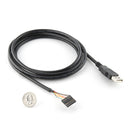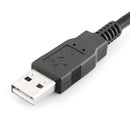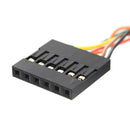| ₹ 1870.0 includes GST and import duties. | |
| B2B customers can avail ₹ 285.18 ITC on this product | |
| 100% Secure Payments | 100% Genuine product |
Description
The FTDI cable is a USB to Serial (TTL level) converter which allows for a simple way to connect TTL interface devices to USB. The VCC pins of this FTDI cable are configured to operate at 5V with 3.3V I/O.
The FTDI cable is designed around an FT232RQ, which is housed in a USB A connector. The other side of the cable is terminated with a 0.1" pitch, 6-pin connector with the following pinout: RTS, RX, TX, 5V, CTS, GND (RTS is the green cable and GND is black).
This cable has almost the same pinout and functionality as our FTDI Basic Breakout board; you can use it to program your Arduino Pro, Pro Mini and Lilypad, etc. For use with those boards, align the black and green wires of the FTDI cable with the ‘BLK’ and ‘GRN’ labels on the PCB. The difference between this cable and the FTDI Basic Breakout is the cable has a 5V Vcc where as the breakout has a 3.3V Vcc. You will still be able to program an Aruidno Pro, Pro Mini, Lilypad, etc. The 5V Vcc supply will not damage these Arduino circuit boards.
Originally, the cable was designed to have 3.3V VCC, however something was lost in translation between SparkFun and our supplier and we got stuck with a whole bunch of FTDI cables that have a slight mix up in wiring. These have 5V VCC, and 3.3V I/O. The 5V Vcc output shouldn’t be a problem unless this cable is being used to power a sensitive circuit such as a sensor.
There are pros and cons to the FTDI Cable vs the FTDI Basic. The FTDI Basic has great LED indicators, but requires a Mini-B cable. The FTDI Cable is well protected against the elements, but is large and cannot be embedded into a project as easily. The FTDI Basic uses DTR to cause a hardware reset where the FTDI cable uses the RTS signal.
Documents:
Bulk Discount
| Quantity | Price |
| 2 | ₹ 1832.6 |
| 3-5 | ₹ 1813.9 |
| 5-10 | ₹ 1776.5 |
| 10+ | ₹ 1739.1 |
Bulk discount will be automatically applied during checkout based on quantity.





